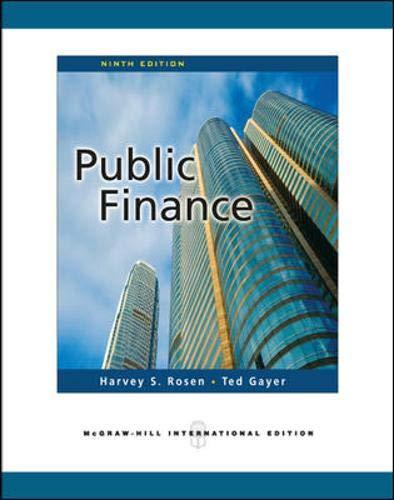Question
Assume that you write a column for a very widely followed financial blog titled Finance Questions: Ask the Expert. Your job is to field readers'
Assume that you write a column for a very widely followed financial blog titled "Finance Questions: Ask the Expert." Your job is to field readers' questions that deal with finance. This week you are going to address two questions from your readers that have to do with dividends.
Question
1:
I own
9
percent of the Standlee Corporation's
50,000
shares of common stock, which most recently traded for a price of
$80.00
per share. The company has since declared its plans to engage in a 2-for-1 stock split.
a. What will my financial position be after the stock split, compared to my current position?
(Hint:
Assume the stock price falls proportionately.)
b. The executive vice-president in charge of finance believes the price will not fall in proportion to the size of the split and will only fall 45 percent because she thinks the pre-split price is above the optimal price range. If she is correct, what will be my net gain from the split?
Question
2:
I am on the board of directors of the B. Phillips Corporation, and the company has announced its plan to pay dividends of
$513,000.
Presently, there are
285,000
shares outstanding, and the earnings per share is $6. It looks to me like the stock should sell for
$40
after the ex-dividend date. If instead of paying a dividend, the management decides to repurchase stock.
a. What should be the repurchase price that is equivalent to the proposed dividend?
(Hint:
Ignore any tax effects.)
b. How many shares should the company repurchase?
c. I want to look out for the small shareholders. If someone owns 100 shares, do you think she would prefer that the company pay the dividend or repurchase stock?
1. a. If the stock price falls proportionately, what will my financial position be after the stock split, compared to my current position?(Select the best choice below.)
A.
There is no change in the value of my position in the company's shares.
B.
There is not sufficient information to judge the change in the value of my position in the company's shares.
C.
There is an increase in the value of my position in the company's shares.
D.
There is a decrease in the value of my position in the company's shares.
Step by Step Solution
There are 3 Steps involved in it
Step: 1

Get Instant Access to Expert-Tailored Solutions
See step-by-step solutions with expert insights and AI powered tools for academic success
Step: 2

Step: 3

Ace Your Homework with AI
Get the answers you need in no time with our AI-driven, step-by-step assistance
Get Started


